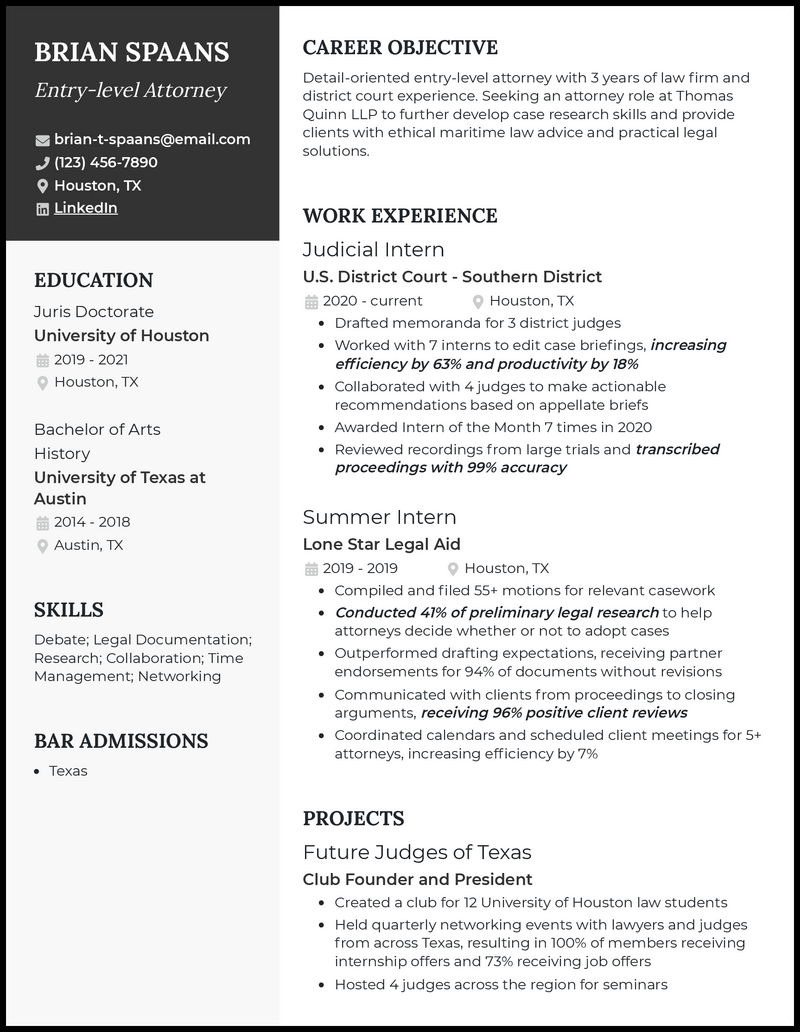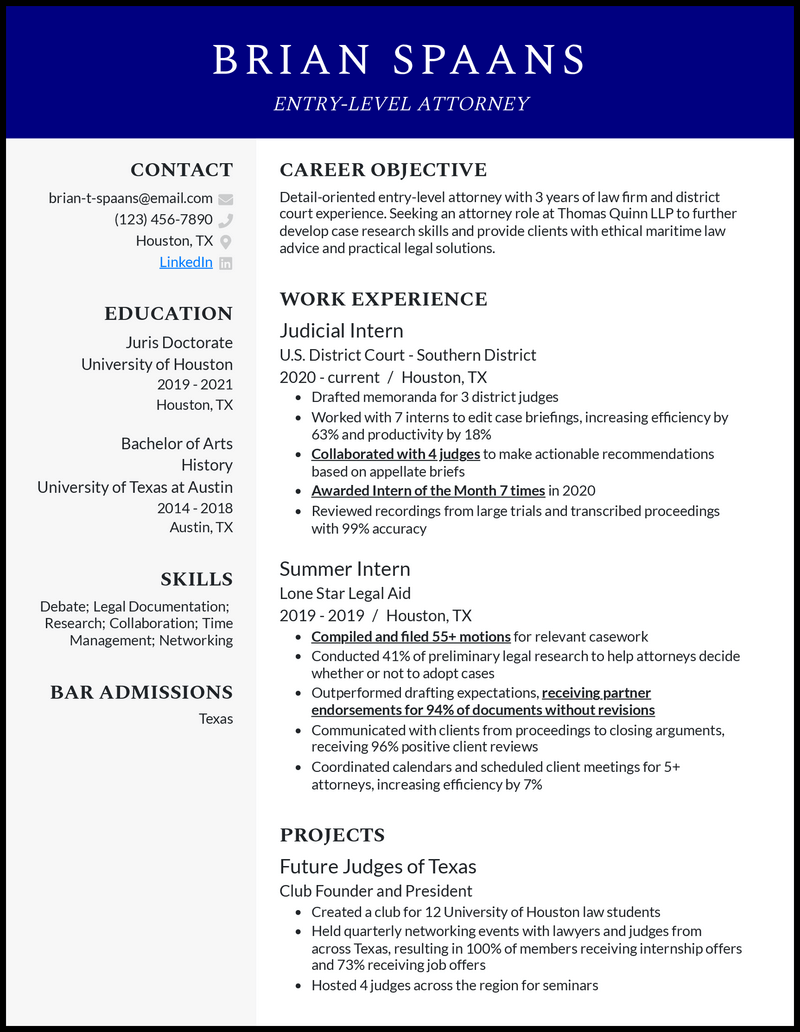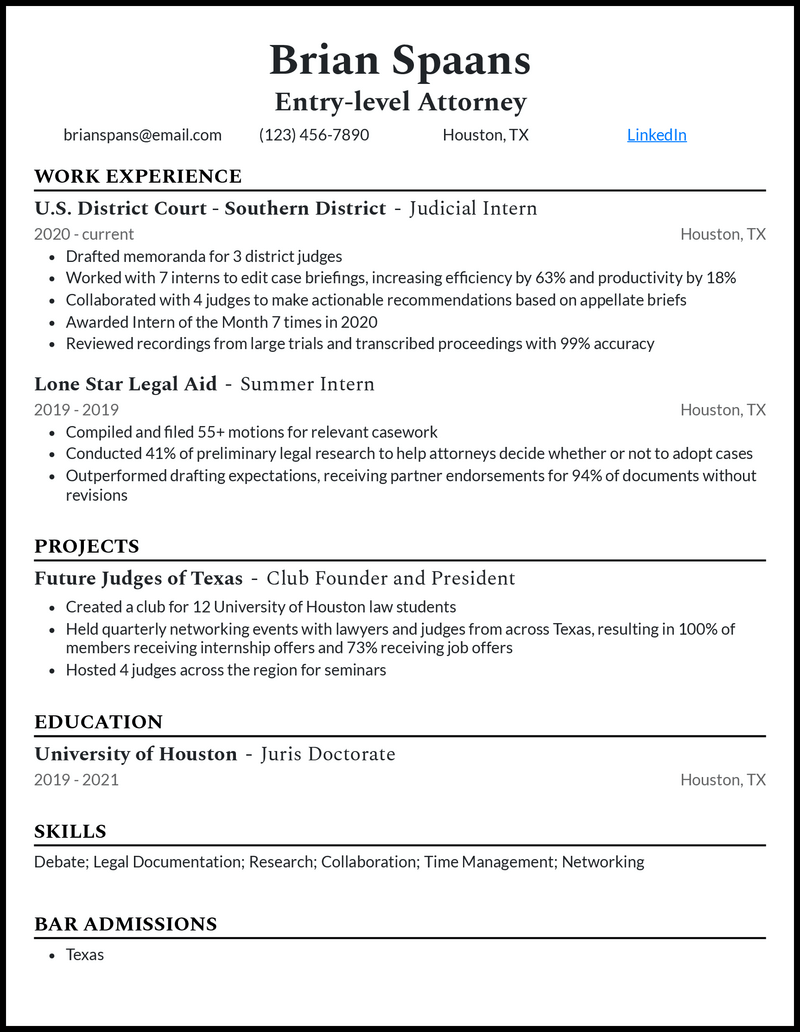
Entry-Level Attorney



Best for senior and mid-level candidates
Resume Builder
Like this template? Customize this resume and make it your own with the help of our Al-powered suggestions, accent colors, and modern fonts.
As an entry-level attorney, you perform basic research, writing, and other general tasks to support a team of paralegals and other attorneys. You focus on a specific area of each case, such as administrative duties or interviewing, to settle into your niche more deeply and ensure positive client outcomes.
But you may feel stuck about your resume, and that’s understandable. How long should it be, what do you put in a resume, and how can you polish it up?
We’ve got this one, no problem: After helping many attorneys in their field, we’ve compiled three entry-level attorney templates and honed some resume advice to get you started!
Why this resume works
- Fresh out of law college and ready to take on courtrooms? Kudos! But before you do, let’s ensure your entry-level attorney resume has a strong opening argument—like a career objective.
- Use the objective space to talk about your reason for applying, and don’t forget to mention any internships, mock trials, or law-related projects that show you’re ready to support senior lawyers and learn a thing or two simultaneously.
Related resume examples
What Matters Most: Your Skills & Experience Sections

Your skills are crucial in an entry-level role! When you don’t have much experience yet, your abilities become extra important. Recruiters want to see that, if you haven’t quite gotten where you want to be just yet, you still have what it takes.
Show that you know what your goals and plans are for helping out your legal team by keeping each skill as profession-specific as possible! Don’t slip into the common pitfall of using overly generic terms like “research” when you could say “legal research” or “federal law research.”
Be specific like that for every resume skill you list! If you’re great at a particular legal technique like legal administration, spell it out. If you’ve got a knack for a certain program, like CaseMap, that helps you do it, list that too!
9 best entry-level attorney skills
- MS Excel
- Cross-Examination
- Local Code Research
- Legal Documentation
- Fact Investigation
- Case Analysis
- MS Teams
- ReviewRight
- LexisNexis
Sample entry-level attorney work experience bullet points
Now that you’ve hooked the recruiter’s attention with an overview of your key specializations in your skill set, it’s time to provide examples of them in action. Not only do you know how to use LexisNexis, but you know how to optimize it.
Alternatively, you could give an example of when you compiled and filed motions for your team to show you’re great with administrative tools and collaboration. Use any prior experience for inspiration: You can look to past jobs to internships to projects if necessary, as long as you can prove relevancy.
A great way to bolster credibility and highlight that relevance is to provide metrics. Always give quantifiable data that shows how you’ve been successful and left a positive, measurable impact.
Here are a few good ideas that we snatched from some of our resume examples:
- Assisted with the e-discovery review on ReviewRight for civil rights cases, saving clients 82% of review costs.
- Conducted 60% of preliminary legal research to help attorneys decide whether or not to adopt cases, resulting in better case selections and 8% increase in success
- Reviewed recordings from large trials and transcribed proceedings with 97% accuracy
- Worked with new interns to edit case briefings, increasing efficiency by 63% and productivity by 18%
Top 5 Tips for Your Entry Level Attorney resume
- Mix up your experience
- When you’re just starting, not everything in your professional background needs to be an official, paid job to count toward your experience. If you were involved in a law club on campus or snagged an internship with the courts, these experiences absolutely count!
- Polish that layout
- If you have a particularly great example of when you cut down on work hours for your legal team by optimizing workflow with MS Excel, it should go front and center! Pick a modern resume template that puts your experience in the spotlight.
- Include your certifications
- Even if your state’s Bar Admission seems like it should be a given, it’s good to include it on your resume anyway—especially when you’re entry-level. You can either place it beneath your education or skills section.
- Don’t forget your cover letter!
- If you lack “bulk” when you get to your experience section, dive into more detail in your cover letter. Don’t repeat what’s on your resume, but provide additional context that reinforces your qualifications, such as why you were awarded intern of the month at the district court.
- Try a resume objective
- Moving from an internship or other less relevant experience to an entry-level attorney job may warrant a career objective to give recruiters an idea of how you can apply skills to a role you haven’t yet begun.
- For example: Detail-oriented entry-level attorney with law firm and district court internship experience. Seeking a role with Thomas Quinn LLP to further develop case research skills and provide clients with ethical maritime law advice and practical legal solutions.
Always stick with one page. As an entry-level attorney, you may be looking for ways to fill it! Try a career objective to explain what you’ll bring to the law firm, or include outside community initiatives or internships where you practiced debate, research, or analysis.
Include any other certifications you’ve earned and relevant coursework, such as Torts, Legal Research and Writing, Administrative Law, Trial Advococay, and Negotiation.
Absolutely! Always refer back to the attorney job description and skim for any keywords or specific skills, such as local code or federal court expertise, and reflect these for each resume.











